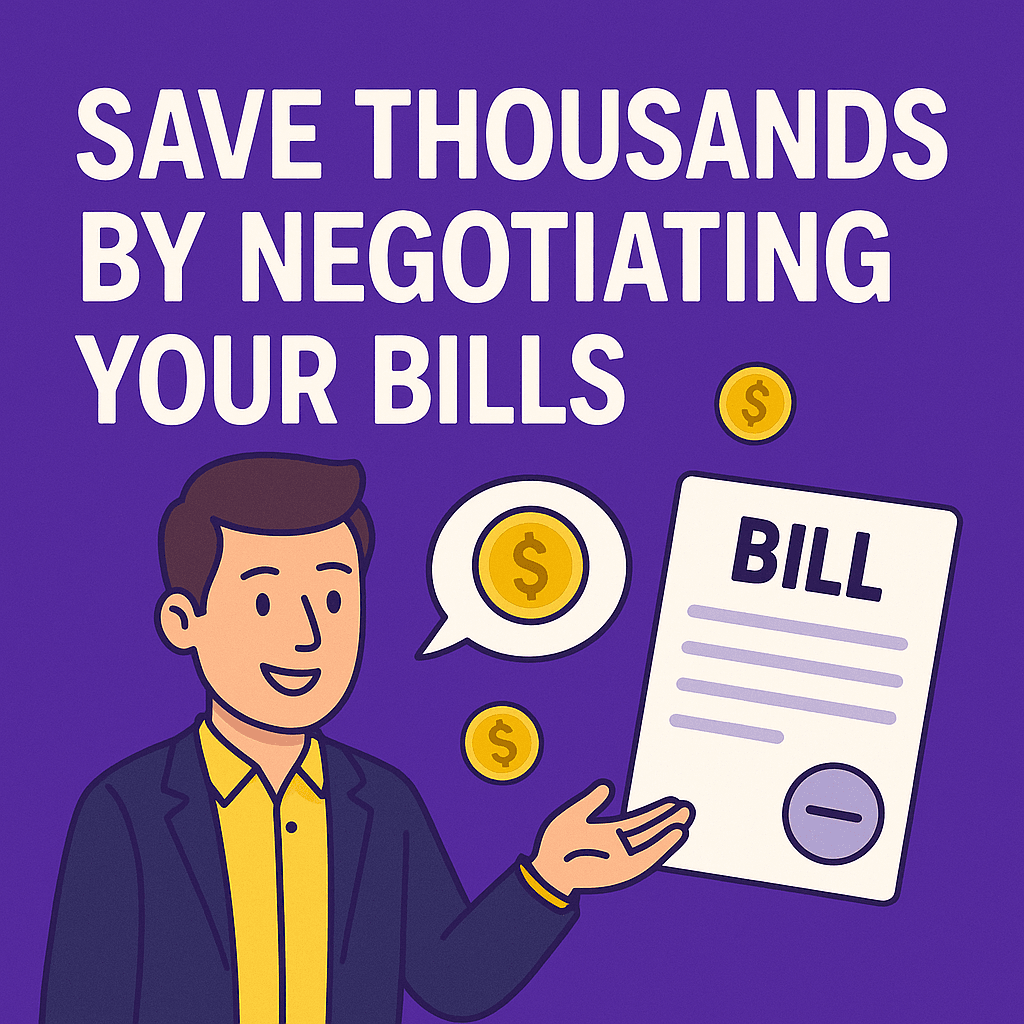Stop Overpaying: How to Negotiate Your Bills and Save Big Every Month
It’s frustrating to watch your monthly bills creep up for cable, internet, phone, and subscriptions. The good news is you can push back and pay less. Companies often have wiggle room and special discounts if you know how to ask. In fact, a Consumer Reports survey found 92% of people who negotiated a bill got some money off or a perk for trying. Simply put: you don’t have to accept every price hike. With a few smart moves (and a bit of nerve), you can keep more cash in your pocket each month.
Let me share a quick story. I used to assume my internet bill was non-negotiable—until a sudden $20/month increase woke me up. Nervously, I called my provider (heart pounding) and politely asked if they could “do anything to lower my rate.” To my surprise, ten minutes later I hung up with a $15/month discount locked in for the next year. That little call saved me $180 annually. I’ve been hooked on negotiating bills ever since, from haggling down my cable package to scoring a loyalty discount on my gym membership. It’s easier than you think once you try it, and the confidence (and savings) feel amazing.

Do Your Homework Before You Negotiate Your Bills
Preparation is everything. Before dialing up customer service, take a little time to gather information and plan your approach. Start by pulling up your latest bills and reviewing exactly what you’re paying for. Are there mysterious fees or services you barely use? Jot those down. Next, do some quick research on current deals: What promotions are your provider offering new customers? What prices are competitors advertising for similar plans? Knowing these details arms you with bargaining chips. Also, note any positives in your history (e.g. “I’ve been a loyal customer for 3 years” or “I’ve never missed a payment”) and any issues you’ve had (outages, billing errors) that might justify a goodwill credit. Here’s a quick prep checklist before you call:
- Find competitor rates: Check if another company (or even your provider’s latest promo) offers a better price for similar service. Save a link or note the details.
- Gather account info: Have your account number, current plan details, and contract terms handy. Note how long you’ve been a customer and your payment history.
- Know your needs: Figure out what you actually use. (No point negotiating to keep 300 channels if you only watch 10.) Be ready to drop or downgrade extras you don’t need.
- Review your bill: Understand each charge and spot any unnecessary add-ons or recent increases.
Doing this homework gives you confidence and concrete points to mention. It shows the company you mean business (in a friendly way) and prevents you from accepting a “deal” that isn’t truly beneficial.

Make the Call: Be Polite, Persistent, and Use a Script
Now for the moment of truth – calling your provider. Take a deep breath and dial the customer service or retention department (you can often say “retention” or select “cancel” in the phone menu to get transferred to someone with more authority to offer discounts). When you get a representative, start on a friendly note. A little kindness can go a long way; the rep is more likely to want to help a polite customer. Explain your situation and get to the point: for example, “Hi, I’m reviewing my budget and noticed my bill is higher than I’d like. I love your service, but I may need to cancel unless I can get a more affordable rate – can you help me with that?” This opener signals that you’re a loyal customer looking for a better deal, not just calling to complain.
Don’t worry if you’re not sure what to say – having a simple negotiation script can boost your confidence. Here’s a script structure that has worked for me and many others:
- Introduce yourself & express loyalty: “Hi, I’ve been a customer for X years and really enjoy the service.”
- State the issue: “My monthly [cable/Internet/phone] bill is getting a bit too expensive for me.”
- Ask for help: “I’m hoping you can help me find ways to lower this bill or get a better rate.”
- Leverage your research: If applicable, mention competitor or new-customer deals: “I see that [Competitor] is offering a similar plan for $Y less… is there any way you can match that for me so I don’t have to switch?”
- Zip it and listen: Let the rep check what’s available. They might offer a promotional rate, a discount, or suggest downgrading services.
Remember to stay courteous but firm. If the first offer is underwhelming, don’t be afraid to politely push a bit more. Try asking, “Is that the best you can do?” or “Are there any loyalty discounts or promotions I might qualify for?” Often, reps have some flexibility but won’t use it until you ask directly. And if you’re not getting anywhere with the current rep, it’s okay to end the call and try again later with someone else. (I’ve literally called back an hour later, reached a friendlier agent, and saved an extra $10/month.) Patience and persistence are key here.

Don’t Accept the First Offer – Negotiate Like a Pro
A common mistake is taking the very first deal you’re offered. Don’t settle too quickly. Companies often start with a modest discount or a bundle offer (“We can throw in HBO for free!”) instead of a true price cut. While a freebie is nice, your goal is to lower the amount of money leaving your wallet each month. If the rep’s initial offer only adds more value (channels, speed) but doesn’t reduce your bill, circle back to the price. You might say, “I appreciate that, but I’m really looking to spend less per month. What else can we do to bring the cost down?” Keep the conversation focused on reducing the bill.
Also, use your ace cards from research. If you know a competitor is cheaper, mention it again. Service providers know that losing a customer is costly for them. (They spend a lot on marketing to acquire new customers, so they’d rather keep you at a discount than see you go.) Don’t be rude or give ultimatums right away, but do convey that you’re ready to switch if they can’t improve the deal. For example: “I’d prefer to stay with you, but [Other Provider] will give me the same package for $30 less… I’m hoping you can match that so I don’t have to make a change.” This sets a clear expectation that you know your options.
If all else fails with the front-line rep, escalate politely. Ask if you can speak with a retention specialist or supervisor who might have more flexibility to offer discounts. Often, saying “Is there someone else I could talk to who might have other options? I’m willing to work with you guys if you can work with me on price” can lead to a better outcome. Retention departments typically can authorize bigger savings to keep you. And always be ready to walk away (or at least call back later). The rep knows you might actually cancel; sometimes just showing you’re serious is enough to prompt a better offer.
Confirm the Deal and Follow Up (Rinse & Repeat)
Once you finally hear the magic words—“We can lower your bill by $X per month”—congratulations! But you’re not done yet. Before you hang up, get the details and lock them in. Kindly ask the rep to confirm the new rate, any changes to your plan, and how long the discount lasts. Also note down the representative’s name and the date/time of the call. If they can send an email confirmation or reference number, even better. This way, if the next bill doesn’t reflect the promised savings (it happens!), you have proof and context when you call back to fix it. One friend negotiated $20 off her cable, only to find no change on the next bill—she rang back armed with notes, and they promptly applied the credit. The lesson: trust, but verify.
Finally, set yourself up for continued success. Mark your calendar for a date a few months before any promo rate expires, or at least once a year, to review and renegotiate again. Bills have a sneaky way of creeping up over time, and companies won’t remind you when a deal ends. I make it a habit every 6-12 months to repeat this process for my major bills. It might feel a bit cheeky, but hey, the squeaky wheel gets the grease. Even if you only save $10 or $20 a month each time, that adds up to hundreds in a year for just a few minutes of effort. And if you couldn’t get a discount today, try again in a few months — pricing and promotions change, and a different rep may have a fresh offer.
Bottom line: Negotiating your bills is one of those rare life hacks that truly pay off. It requires minimal time, no special skills (just a polite voice and a dash of boldness), and it costs nothing to ask. The worst they can say is “no,” and you’re no worse off. But if they say “yes” — you’ve just given yourself a raise without changing jobs or cutting back on enjoyment. So go ahead, make that call and see how much you can save. Your future self will thank you for it!
External Resources:
- NerdWallet – Use This Script to Lower Your Cable and Internet Bills : A step-by-step script and tips for negotiating with TV/Internet providers.
- Payactiv – Negotiating Bills: Scripts for Lowering Your Monthly Expenses : Sample phone scripts for cable, internet, insurance, and more, plus negotiation tips.
- I Will Teach You To Be Rich – How to Lower Your Cell Phone Bill (With Scripts) : Ramit Sethi’s guide on cutting your cell phone costs, including word-for-word negotiation examples.
- Allconnect – 7 Tips for Negotiating a Lower Internet or Cable Bill : Insider advice from service reps on haggling for better deals and what’s realistically negotiable.
- Money Talks News – 7 Ways to Negotiate a Better Cable Package : Additional strategies to reduce your cable TV bill, from timing your calls to considering alternatives.
Related Posts:
- Best Budgeting App for 2026: Unlock Financial Freedom Today
- Join Buy Nothing Groups to Save Thousands on Free Stuff
- Your Guide to the 2025 Tax Changes: What the New Law Means for You
- 5 Fun Money Saving Challenges to Boost Your Savings
- The Ultimate Guide to Cancel Unwanted Subscriptions & Save $1600+
Disclaimer: SaveMeMonthly.com provides general money-saving info, not financial, legal, tax, insurance, or professional advice. Offers, rates, and terms change and vary by location. Always confirm details with the provider before you buy. We may earn a commission from some links at no extra cost to you. Trademarks belong to their owners. Your choices are your responsibility.


Leave a Reply